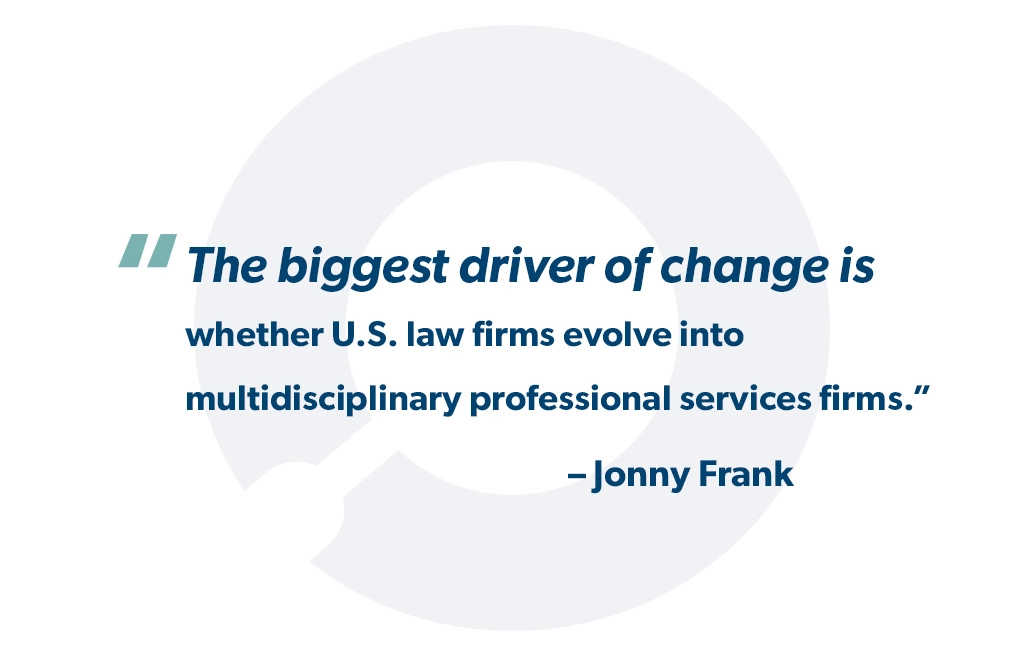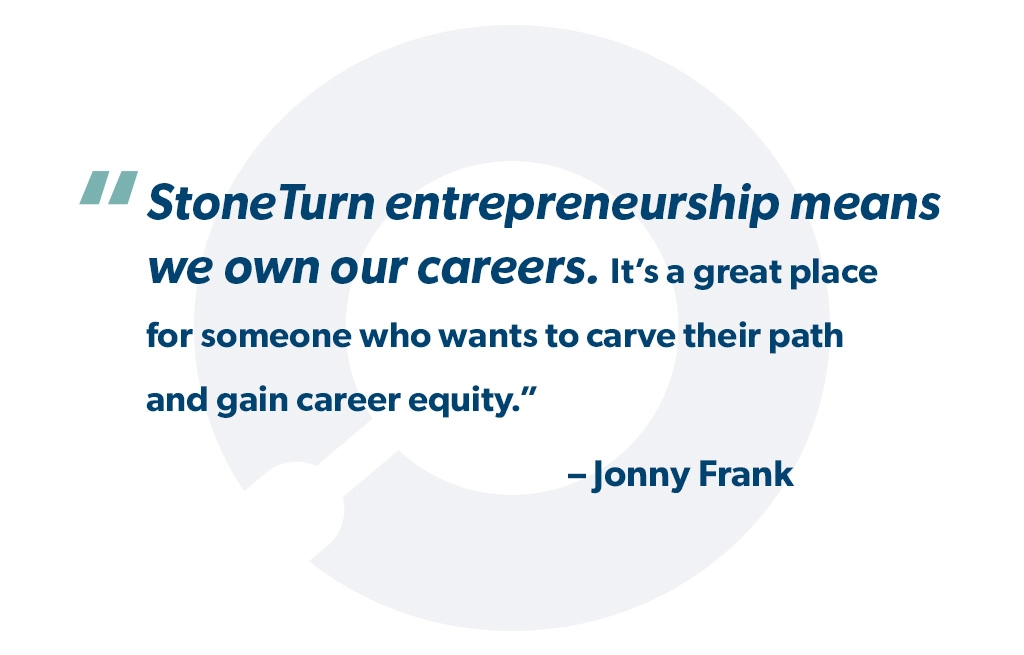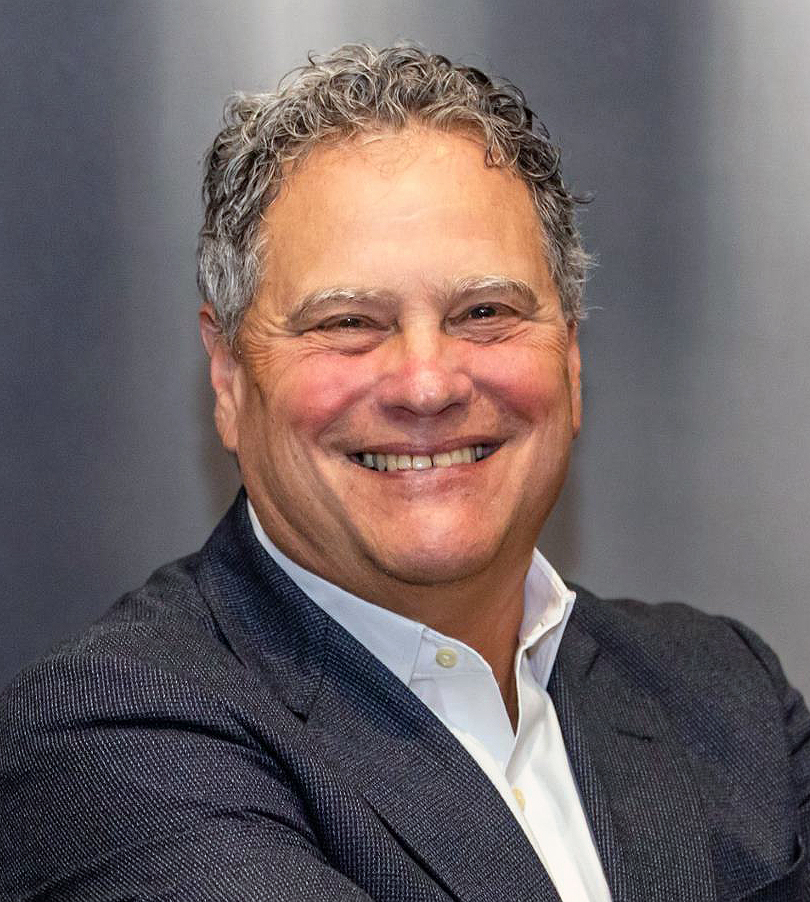To celebrate StoneTurn’s 20th Anniversary, we’re spotlighting our people. Meet Jonny Frank, a Partner in StoneTurn’s New York office.
In this Q&A, Jonny reflects on his career as a former Federal prosecutor and Big Four Partner, and how those experiences shaped his client service trajectory for the long-term. Jonny also highlights StoneTurn’s entrepreneurial culture and provides insight on where he sees the consulting industry headed in the future.
Culture
What drew you to StoneTurn?
The most significant motivating factor 12 years ago remains true today: StoneTurn walks the talk on culture. Unlike other professional services firms, we have no individual or group PNLs. It is not an “eat what you kill” environment. Partners do not receive “origination credit.” We are all invested in the success of any given matter.
When I joined, I opened the New York office – seven years into the firm’s history. Despite the client-rich environment, New York has a reputation of a dominating culture, and it can be a tricky road to navigate for a firm that puts so much value in its culture. Shortly after I joined, we brought in large monitorships, which made the New York office dominant from a headcount and economic perspective. However, it did not impact the culture the way people were afraid of a large New York office. We had people across the firm working on these monitorships, and successfully maintained a one-firm culture throughout the engagements.
What does entrepreneurship at StoneTurn mean to you?
I don’t know why StoneTurn uses titles because we are a very flat organization. Everybody is an employee, no matter their title. Everybody is a member of the team.
StoneTurn entrepreneurship means we own our careers. It’s a great place for somebody who wants to carve their path and gain career equity.
To give you an example: When opening our New York office, there was no guide for me. Before joining, I found an office and, when I arrived, found a load of boxes to be unpacked, perhaps accompanied with a note saying, “good luck.” There was a lot of freedom and trust to grow it how I and, later, the NY team thought we should go to be successful. From day one, there was inherent trust, which became earned trust. We just did it, knowing that everyone had our back. You need that in an entrepreneurial environment.
Business
What types of trends do you see persisting or impacting consulting for the long-term?
One hires a consultant when you either cannot do something or do not want to do something. That will not change, but the factors operating in the background will.
For example, law firms previously did not pay much attention to remediation and compliance. Now, they’re increasingly more involved. For a business like ours, law firms are like primary care physicians: they refer their clients to specialists, or firms like StoneTurn, to help with the most complex issues. In order to stay relevant, we need to continue to enhance our skills and areas of compliance, helping lawyers and others appreciate our specialist capabilities.
What are the critical skills for someone who wants to succeed in a compliance position?
If you don’t know the COSO framework, it’s a non-starter. You need the knowledge and skills to evaluate the design and test the operating effectiveness of entity-level controls (e.g., control environment, 3 LoD model, risk assessment, compliance testing function(s) and transaction-level controls (e.g., anticorruption control).
At the same time, I’d say there are also non-technical skills, e.g., explaining the business benefits of compliance.
A litmus test for an effective compliance program is, “What would happen if the law was revoked?” Consider smoking, and workplace safety. Businesses would not change their policies if the government eliminated anti-smoking and workplace safety laws. But would ABC and AML programs change if the government eliminated corruption and anti-money laundering laws and regulations?
That’s the posture needed to set up an effective compliance programs—it’s not just law, it’s the right thing to do. A good example is money laundering—while KYC policies and procedures can be operationally expensive, most organizations would find it difficult to justify their corporate purpose if they were funneling money for terrorists or other illicit actors.
Predictions for the Future
Looking into your crystal ball, tell us what you think the biggest drivers of change will be in 10 years?
The biggest driver of change is whether U.S. law firms evolve into multidisciplinary professional services firms. In some states, non-lawyers can own law firms. This is also prevalent in the U.K., which opens the door for law firms to become multidisciplinary firms. This presents challenges and opportunities for us, and the laggards will be those who are not innovating and finding new ways to add value.
Reach out to Jonny Frank if you would like to discuss any of the topics above.








